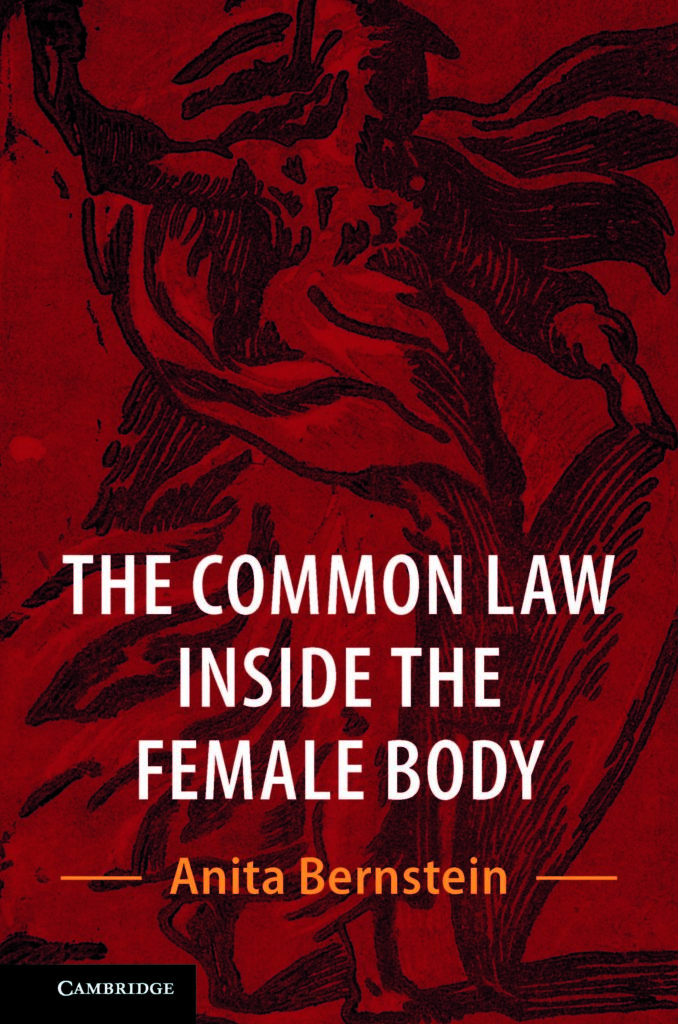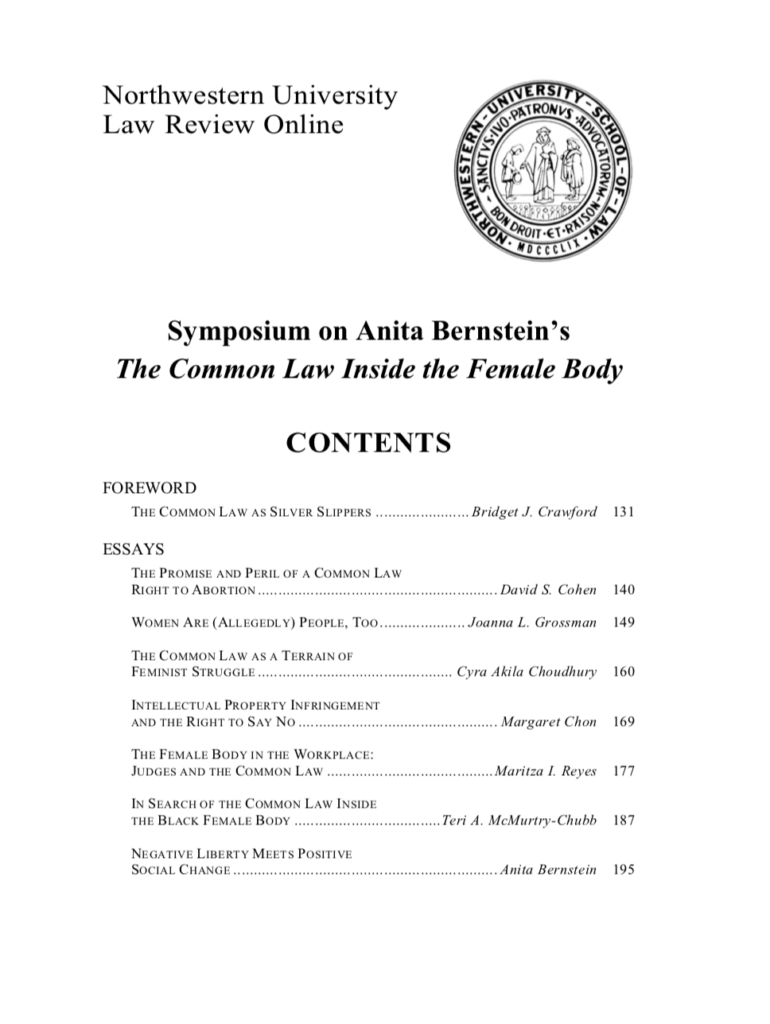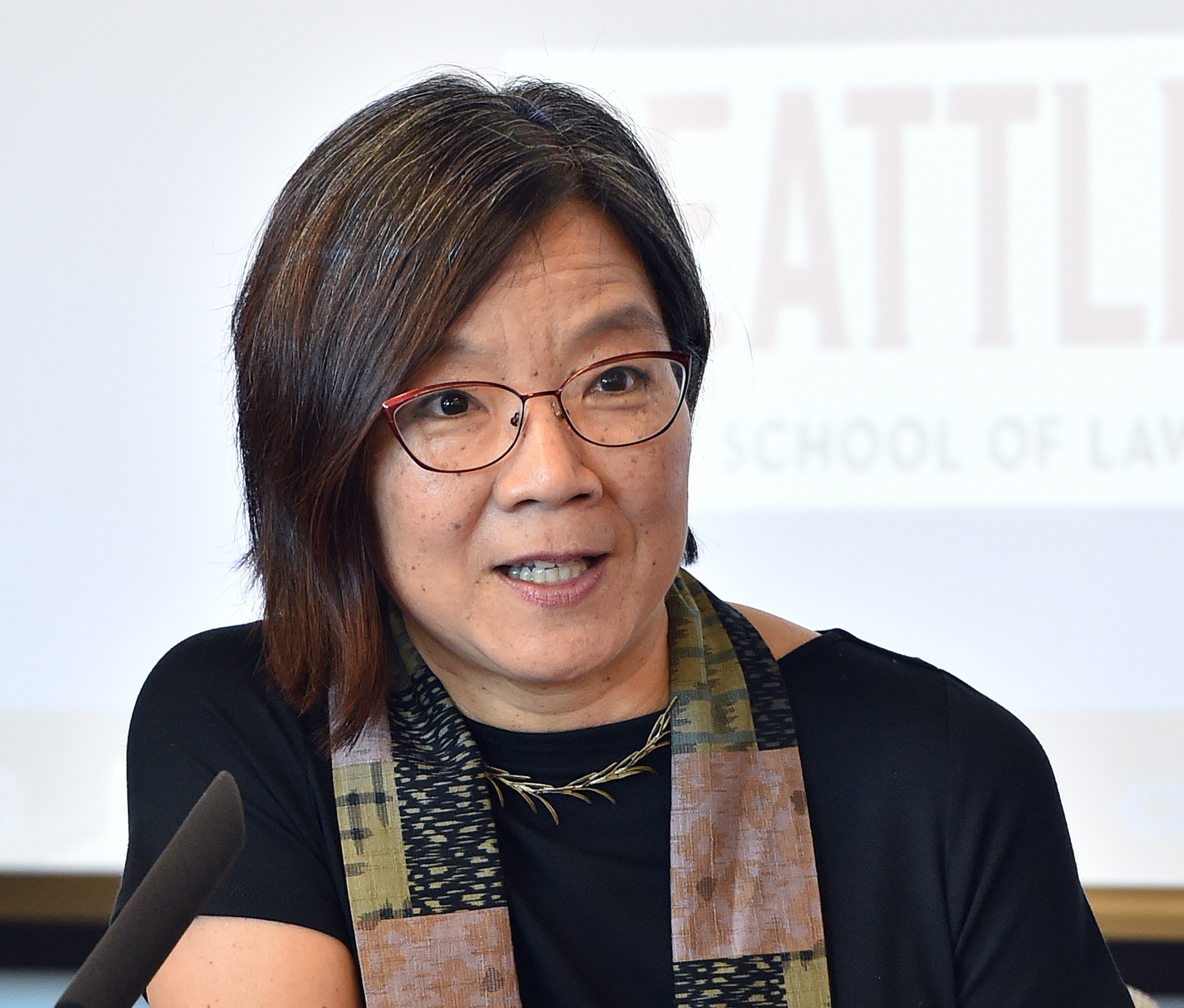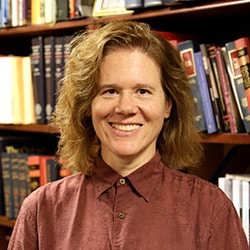2019 NULR Online Symposium
The Common Law Inside the Female Body, by Anita Bernstein

Anita Bernstein, The Common Law Inside the Female Body (Cambridge University Press 2019).
Publisher’s description of The Common Law Inside the Female Body: In The Common Law Inside the Female Body, Anita Bernstein explains why lawyers seeking gender progress from primary legal materials should start with the common law. Despite its reputation for supporting conservatism and inequality, today’s common law shares important commitments with feminism, namely in precepts and doctrines that strengthen the freedom of individuals and from there the struggle against the subjugation of women. By re-invigorating both the common law – with a focus on crimes, contracts, torts, and property – and feminist jurisprudence, this highly original work anticipates a vital future for a pair of venerable jurisprudential traditions. It should be read by anyone interested in understanding how the common law delivers an extraordinary degree of liberty and security to all persons – women included.

Bridget J. Crawford
The Common Law as Silver Slippers
Essay Abstract: This essay introduces a collection of Symposium Essays examining Anita Bernstein’s book, The Common Law Inside the Female Body (Cambridge University Press, 2019). The authors engage in one or more of three broad intellectual moves: testing and exploring the limits of the book’s thesis that the common law should be resurrected as a legal strategy to protect women’s rights; applying the concept of condoned self-regard; and questioning the common law from viewpoints of groups historically (and presently) subject to unequal treatment.

Bridget Crawford is a Professor of Law at the Elisabeth Haub School of Law at Pace University.
David S. Cohen
The Promise and Peril of a Common Law Right to Abortion
Essay Abstract: To those of us who associate the common law with the policy preferences of propertied, conservative, old white men, Bernstein’s account of the common law inside the female body is a novel and welcome interpretation of our negative liberty tradition. Given the current attacks on abortion rights from state legislatures and the federal judiciary, Bernstein’s common law right to terminate an unwanted pregnancy could, if widely adopted, help protect abortion rights in the future. However, in the wrong hands, her grounding could play into the goals of the anti-abortion movement without helping protect actual access for people seeking abortions. Thus, her account of this right is a double-edged sword, with much promise, but also much peril.
 David S. Cohen is a professor of law at Drexel University’s Thomas R. Kline School of Law. He is the co-author of the forthcoming Obstacle Course: The Everyday Struggle to Get an Abortion in America (California 2020) (with Carole Joffe) and Living in the Crosshairs: The Untold Stories of Anti-Abortion Terrorism (Oxford 2015). He is on the board of the Abortion Care Network and the Women’s Law Project. (Photo: Zave Smith)
David S. Cohen is a professor of law at Drexel University’s Thomas R. Kline School of Law. He is the co-author of the forthcoming Obstacle Course: The Everyday Struggle to Get an Abortion in America (California 2020) (with Carole Joffe) and Living in the Crosshairs: The Untold Stories of Anti-Abortion Terrorism (Oxford 2015). He is on the board of the Abortion Care Network and the Women’s Law Project. (Photo: Zave Smith)
Joanna L. Grossman
Women are (Allegedly) People, Too
Essay Abstract: This Essay evaluates Bernstein’s argument that the common law supports a virtually unfettered right to terminate a pregnancy. It situates her argument against the backdrop of the constitutional right of abortion, which has been the primary lens through which women’s reproductive rights have been viewed. It then considers the newly composed Supreme Court and the threat it portends to reproductive rights. It concludes by suggesting the common law, as Bernstein understands it, could come to the rescue of women and their full humanity, but only if courts are willing to see women as people, too.
 Professor Joanna Grossman is the Ellen K. Solender Endowed Chair in Women and Law and Professor of Law at SMU Dedman School of Law. She is an expert in sex discrimination law and has written extensively about workplace equality and reproductive rights. She is the author of Nine to Five: How Gender, Sex, and Sexuality Continue to Define the American Workplace (Cambridge 2016), a lively and accessible collection of essays about the persistence of discrimination—and why it is far too soon to declare the triumph of working women’s equality. She is the co-author of Gender and Law: Theory, Doctrine, Commentary (Aspen 2016), a sex discrimination casebook, and of Inside the Castle: Law and the Family in 20th Century America (Princeton 2011), a comprehensive social history of American family law. She is the coeditor of Gender Equality: Dimensions of Women’s Equal Citizenship (Cambridge University Press 2009), an interdisciplinary anthology that explores persistent gaps between formal commitments to gender equality and the reality of women’s lives. Professor Grossman is a regular columnist for Justia’s Verdict and is an elected member of the American Law Institute.
Professor Joanna Grossman is the Ellen K. Solender Endowed Chair in Women and Law and Professor of Law at SMU Dedman School of Law. She is an expert in sex discrimination law and has written extensively about workplace equality and reproductive rights. She is the author of Nine to Five: How Gender, Sex, and Sexuality Continue to Define the American Workplace (Cambridge 2016), a lively and accessible collection of essays about the persistence of discrimination—and why it is far too soon to declare the triumph of working women’s equality. She is the co-author of Gender and Law: Theory, Doctrine, Commentary (Aspen 2016), a sex discrimination casebook, and of Inside the Castle: Law and the Family in 20th Century America (Princeton 2011), a comprehensive social history of American family law. She is the coeditor of Gender Equality: Dimensions of Women’s Equal Citizenship (Cambridge University Press 2009), an interdisciplinary anthology that explores persistent gaps between formal commitments to gender equality and the reality of women’s lives. Professor Grossman is a regular columnist for Justia’s Verdict and is an elected member of the American Law Institute.
Cyra Akila Choudhury
The Common Law as a Terrain of Feminist Struggle
Essay Abstract: This essay engages the argument that the common law is an overlooked source of women’s negative liberties. It raises some questions about the common law’s ability to give protection to those not already considered rights holders, about the strength of relying on an analogy to property law as a basis for these liberties and it suggests further inquiry into global economic links that might shed light on how the common law in certain locations have been the source of dispossession rather than empowerment.

Cyra Akila Choudhury is Professor of Law and FIU College of Law. Her expertise is in comparative and international gender and family law, property, and minority rights.
Margaret Chon
Intellectual Property Infringement and the Right to Say No
Essay Abstract: This review essay examines the implications of Bernstein’s claims for intellectual property (IP) law. It focuses on two challenges: IP’s concern with the negative liberties of both the IP owner and the alleged infringer, and its primary emphasis on commercial rather than other types of harm. Ultimately, it concludes that Bernstein’s core insights extend to and can be extended by IP.

Margaret Chon is the Donald & Lynda Horowitz Professor for the Pursuit of Justice, and formerly Associate Dean for Research at Seattle University School of Law. She is the author of numerous articles, books, book chapters, and review essays on intellectual property, as well as race and law. Her recent co-edited volume, The Cambridge Handbook of Public-Private Partnerships, Intellectual Property Governance, and Sustainable Development (Cambridge University Press 2018), focuses on the relationship of global intellectual property institutions to human and sustainable development goals. An alumna of the University of Michigan (M.H.S.A. and J.D.) and Cornell University (A.B.), she clerked for both the Honorable A. Leon Higginbotham and the Honorable Dolores J. Sloviter of the U.S. Court of Appeals for the Third Circuit. Professor Chon is a member of the American Law Institute and the American Bar Foundation.
Maritza I. Reyes
The Female Body in the Workplace: Judges and the Common Law
Essay Abstract: Despite some progress, women are still expected to endure attacks in our daily lives, including in our workplaces. I posit that federal judges have played a role in denying women “negative liberty,” which Professor Anita Bernstein defines as the “right to say no to what [human beings] do not want.” Therefore, my essay is an effort to educate federal judges about the role they should play, when interpreting law, to help female bodies achieve full “condoned self-regard,” another concept developed in Bernstein’s book and explained in my essay.

Maritza I. Reyes, Associate Professor of Law, Florida A&M University College of Law; LL.M. Harvard Law School, J.D. Nova Southeastern University Shepard Broad College of Law, summa cum laude.
Teri A. McMurtry-Chubb
In Search of the Common Law Inside the Black Female Body
Essay Abstract: This essay engages Bernstein’s original work through the lens of Black women’s experiences with bodily autonomy. It invites the reader to consider how and where the common law resides inside the Black female body.

Teri A. McMurtry-Chubb is the Visiting Distinguished Professor of Law at UIC John Marshall Law School, and a Professor of Law at Mercer University Walter F. George School of Law. She researches, teaches, and writes in the areas of critical rhetoric, discourse and genre analysis, and legal history. She has lectured nationally on structural discrimination in educational institutions and the workplace, and is a leader in designing curricula to facilitate diversity, equity, and inclusion efforts. Professor McMurtry-Chubb is the author of the book Legal Writing in the Disciplines: A Guide to Legal Writing Mastery (Carolina Academic Press 2012), and a contributor to Feminist Judgments: Rewritten Opinions of the United States Supreme Court (Cambridge University Press 2016), in which she authored the rewritten opinion for Loving v. Virginia, 388 U.S. 1 (1967).
Anita Bernstein
Negative Liberty Meets Positive Social Change
Essay Abstract: Negative liberty, a central theme of The Common Law Inside the Female Body, gets revisited here. The book explains and defends an entitlement to refuse unwanted boundary-crossings. Inspired by the accomplishments and politics of the authors gathered in the Symposium, this Essay seeks to extend their progressive work by connecting the book’s thesis to women of color.
 In addition to The Common Law Inside the Female Body, Anita Bernstein’s books include Marriage Proposals (ed., NYU Press), Understanding Torts, and Torts: Questions and Answers (both Carolina Academic Press). She is Anita and Stuart Subotnick Professor at Brooklyn Law School.
In addition to The Common Law Inside the Female Body, Anita Bernstein’s books include Marriage Proposals (ed., NYU Press), Understanding Torts, and Torts: Questions and Answers (both Carolina Academic Press). She is Anita and Stuart Subotnick Professor at Brooklyn Law School.
